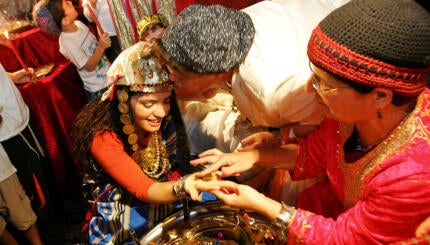“My son-in-law is so lovely, and he and my daughter are very happy, and I’m happy for them. But he’s so Italian, and Catholic. He’s not very religious, but I don’t know. I’m so worried because I can see that it’s going to be… different.”
I’ve heard variations of this concern from Jewish parents of adult children many times. Their child is in an interfaith marriage. They’re worried about what this means. It’s not surprising: For years they’ve received the message that intermarriage is terrible for the Jews. It’s interesting to me, though, that their focus is on the non-Jewish person — who they almost invariably like very much — who has married their Jewish son or daughter.
I have begun to ask the Jewish parent who comes to speak to me about this the following questions: What is your son or daughter’s relationship with Judaism? Is it important to him or her to be Jewish? Is it important to him or her to have a Jewish home? If the answers to these questions are along the lines of: strong, or good; yes; and yes; I say, “Well, then they will have a Jewish home.” If the Jewish partner in an interfaith relationship is committed and interested in having Judaism as a significant part or his or her life, then it will be so, no matter who they marry.
I believe that intermarriage has become a scapegoat for the American Jewish community. If we have failed to raise Jews who love Judaism and can’t imagine their lives without some kind of Jewish practice, then it doesn’t matter who they marry — their commitment to the practice of Judaism will not be strong. If we have succeeded at raising Jews who love Judaism and can’t imagine their lives without some kind of Jewish practice, then it doesn’t matter who they marry — Jewish practice will be part of their lives and that of their families.
It’s easy to condemn intermarriage, and much harder to ask ourselves if we’ve succeeded in raising our children to love being Jewish. How many young adult Jews hated Hebrew school? How many were raised with Judaism as a chore, or with little Jewish practice in their own families? From parents of religious-school-aged children, I hear about this a lot too.
Yesterday a post was circulating on my Facebook feed about how Liz Polay-Wettengel had trouble finding acceptance of her interfaith family — which she desperately wanted to connect to Judaism — in the Jewish community. (She did not try my synagogue, where I think she would have found what she was looking for—though Brooklyn may have been a tough commute depending on where she lives.)
A rabbinical student (full disclosure: my rabbinic intern) wrote about her sense of betrayal that the Reform movement is upholding its policy that rabbinical students at its seminary, Hebrew Union College-Jewish Institute of Religion, cannot be in interfaith relationships.
READ: Reconstructionists To Accept Rabbinical Applicants With Non-Jewish Partners
Historically, our rabbis, who were the establishment, the leadership, of Judaism, hated tashlich, the ritual we perform at Rosh Hashanah when we go to a body of running water and throw in the lint from our pockets, symbolically throwing our sins into the water to be washed away. The rabbis objected to the ritual because of its magical elements, and of course you can’t just throw your sins into the water and be rid of them! But the people found this ritual so evocative, they would not give it up. Eventually rabbis had to relent, and we perform tashlich to this day.
There is an analogy to intermarriage. Parts of the Jewish establishment have not given up on fighting it, though many, many Jews don’t see a problem with it. There are leaders in the liberal Jewish community who believe that it can and should be stopped, or that there is a hybrid place of “we don’t like it, but once it has happened, we will welcome those who have engaged in it, but they can’t be rabbis.” There is a Talmudic principle of l’chatchilah and b’di-avad. L’chatchilah means “at the beginning,” and on this topic, it would be: “At the beginning, you should marry someone Jewish if you are a Jew.” B’di-avad means “after the fact.” On this topic, it would be: “But if you’ve already married, and you’ve married someone who isn’t Jewish, well, you’re welcome in our community.” This, I think, is the principle on which the Reform movement is currently operating, but it is unsatisfying for many of the movement’s adherents.
READ: After Lull, Intermarriage Debate Reignites
We don’t actually know what would happen if we truly opened our arms to interfaith families, if we stopped sending the message that they are bad for Judaism, if we treated them like any other families who are doing Judaism.
Let’s stop living in fear of intermarriage. Let’s model the richness of the experience of Jewish practice for our children so that the idea of raising their own children as anything other than Jewish is inconceivable. Let’s love the non-Jews who become part of our families and communities, and honor them when they participate in Judaism and raise Jewish kids. Let’s embrace the joy of Judaism, and welcome everyone who wants to experience it into our communities.
Rosh Hashanah
Pronounced: roshe hah-SHAH-nah, also roshe ha-shah-NAH, Origin: Hebrew, the Jewish new year.



